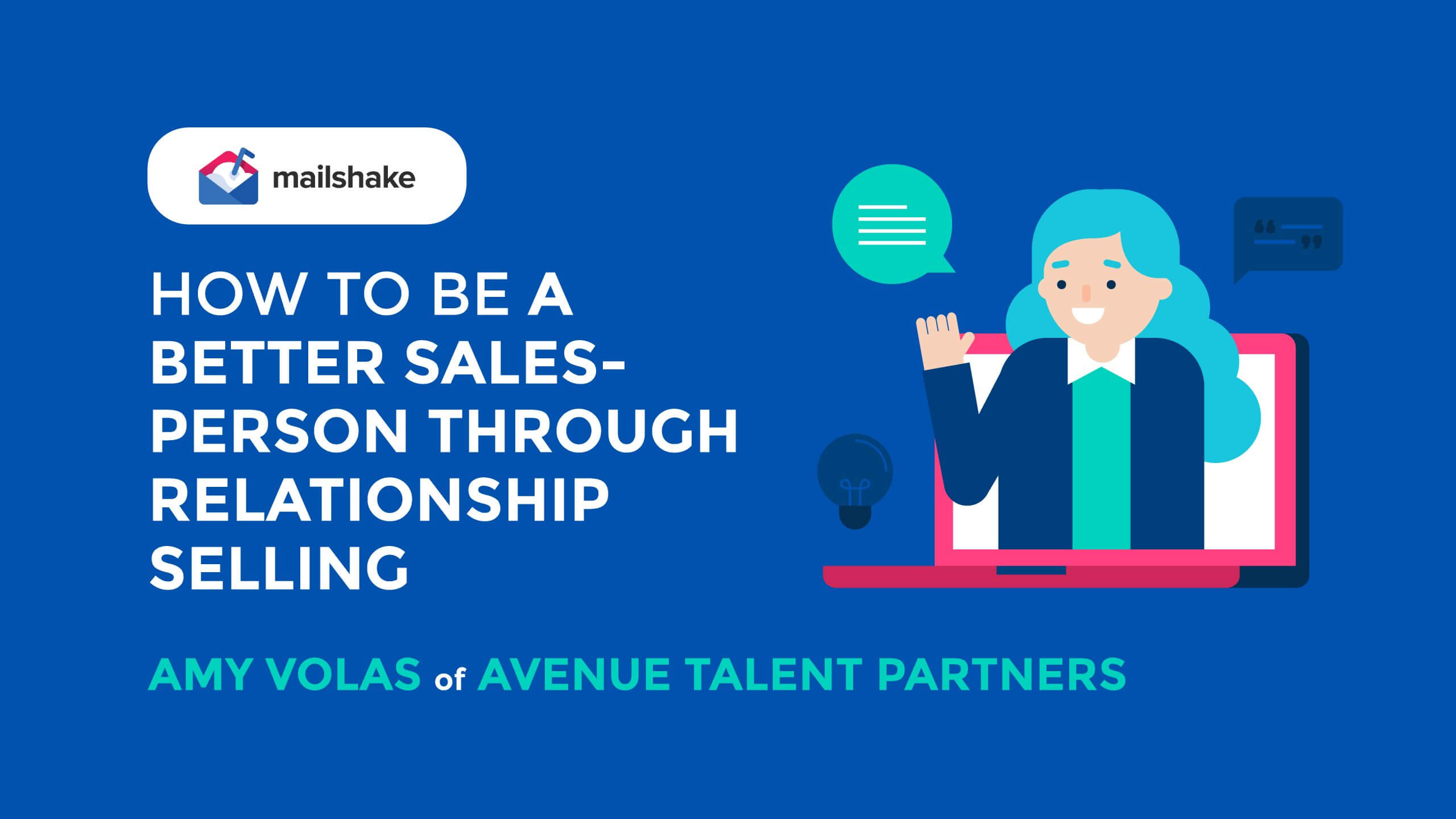42 Sales Interview Questions and Answers for the Best New Hire

Contents
Sales teams are the driving force for a company’s growth and revenue. There’s no denying the importance of an excellent salesperson, and these sales interview questions can help you hire the best.
From tried-and-true classics to creative inquiries of the candidate’s sales knowledge, managers can learn more about a candidate’s strengths, interests, and experiences in just a 30-minute interview.
New and experienced hiring managers alike can benefit from switching up their interview questions every now and then. So before your next appointment, consider updating your questions to learn more about the person behind the resume.
1. Why Are You Looking for a New Role?
This is a go-to for interviewers in any career or industry, as it provides insight into the interviewee’s work experiences, personality and motivations. For example, candidates looking to climb the career ladder won’t benefit from a role with no room for growth. On the other hand, an expanding company that’s always looking for potential managers to train would be a mutually beneficial opportunity for the sales team and aspirational candidate.
Interviewers should watch for how someone talks about conflicts in the workplace, their aspirations in a new role and how their goals and experiences align with the open position. Personal narratives of how they’ve evolved and what they expect from the next leg of their career are great ways for a candidate to deliver these details.
Weak Candidate Answer:
- The candidate talks poorly of their current position or teammates.
- There’s no reference to your company’s benefits that excite them or the specific role’s expectations.
- The interviewee prioritizes pay over other career benefits, which may indicate a lack of interest in your company as a long-term career opportunity.
Strong Candidate Answer:
“My current role was a great fit as a college graduate, but the expectations haven’t evolved to keep pace with my expertise. I look forward to the opportunity to refine my skill set through new challenges as a sales representative on your team.”
- The answer highlights the positives of their current career while addressing that it’s no longer a good fit.
- The interviewee showcases their values for hard work and personal development.
- The candidate connects their needs to the role they’re interviewing for.
2. Can You Sell Me This Pen?
How would you sell your favorite gel pen or a sweet Fuji apple? Sales managers love this question because it provides a glimpse into the candidate’s sales process and how they communicate with a prospective client.
Pens and apples are particularly popular subjects, but you can encourage a candidate to sell anything you have on hand for a bigger challenge or closer product tie. However, it’s best to stick to a familiar item so that the interviewee doesn’t have to make too many assumptions in their sale.
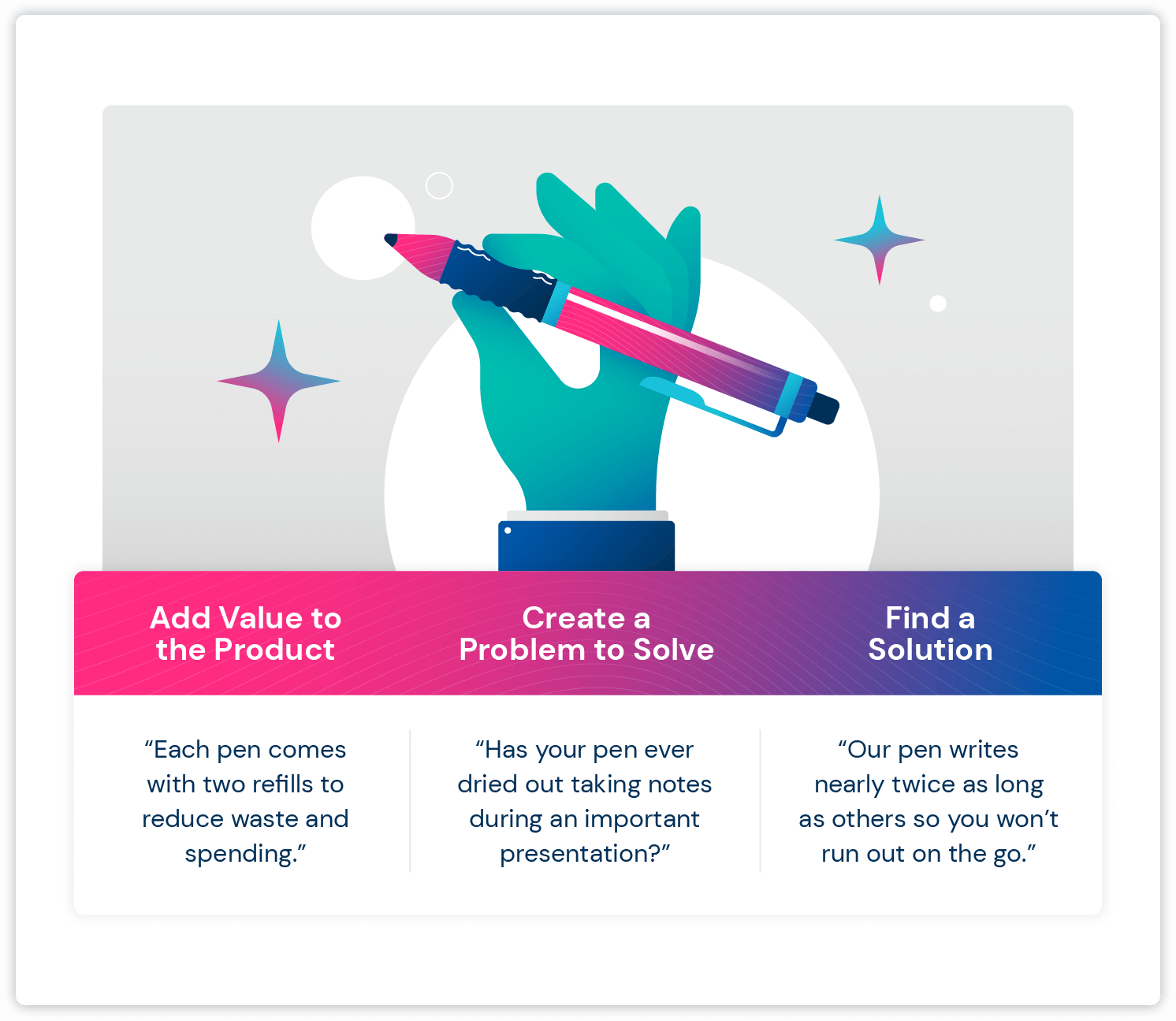
Weak Candidate Answer:
- Candidate rushes to begin pitching without thinking through their sell and fails to highlight unique benefits to the pen or consider the user’s needs.
- The interviewee doesn’t ask any questions to identify the user’s habits and how this product solves a problem.
- The answer doesn’t follow any sales pitch best practices — particularly trying to close the sale.
Strong Candidate Answer:
“Did you know that the average pen can write 45,000 words before it dries up? Personally, that might cover three weeks of writing down prospect names and phone numbers! I know you wear a lot of hats as a manager and your to-do lists must take a lot of ink.
Well, this gel pen can write up to 70,000 words and it comes with two refills, so you can reduce waste and cost on office supplies. I’d love to supply your whole team with some of these pens. Would you be interested in a box of 500 pens with refills and your company logo for a $40 trial?”
- The answer includes a statistic or social proof for the product and clearly identifies how the product satisfies a need in the pitch.
- The interviewee asks questions to identify the prospect’s needs to connect with the product’s benefits.
- The candidate finishes with a direct request to close out the pitch.
3. What Does Your Current Sales Process Look Like?
Any great sales process demonstrates understanding of the customer journey and aligns with the sales pipeline, but the best sales processes are customized to the salesperson’s strengths and consider prospect needs.
Asking a candidate to walk through their current process helps you see how well they understand this journey, their sales strengths and how well their sales experience matches your business needs.
Weak Candidate Answer:
- There’s no clear indication that the candidate knows each step of a typical sales process and its intent or timeline.
- The candidate doesn’t provide any specific metrics validating their success or experience in sales.
Strong Candidate Answer:
“I typically connect with prospects after they’ve made contact with a customer service representative or outreach coordinator in the prospecting phase. At this point, I get to know the prospect and their needs to prepare solutions for their team, anticipate their next questions and develop a presentation to showcase how our services can save them time and money.
We then chat through their concerns, address any objections and make our closing offer. Follow-ups are a huge part of our winning sales strategy, too, so I like to schedule those out in advance.”
- The candidate takes care to address each stage of the sales cycle and their role in advancing the customer journey.
- They acknowledge sales processes they don’t personally fulfill, indicating an understanding of the whole customer journey and workflow.
4. What Do You Know About Our Company and Product/Service?
Even the most amazing salesperson can’t perform if they don’t understand what they’re selling. This question gives you a peek at what a candidate knows and likes about a product, as well as an idea of their interview preparation.
Any candidate entering a sales interview should have some idea about what they’re selling, its competition and its benefits. If they didn’t do a little digging beforehand, they may not be the right fit for your team.
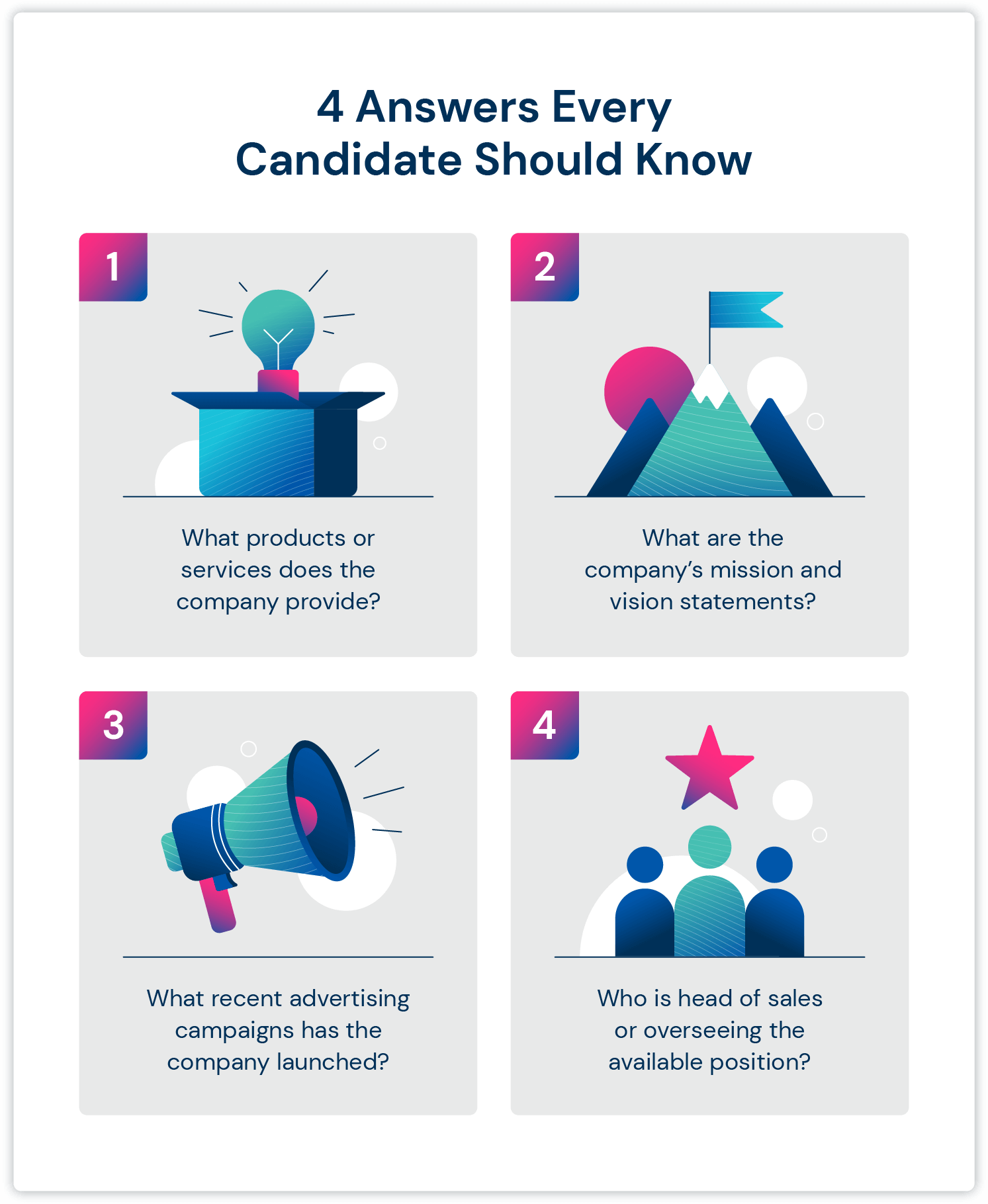
Weak Candidate Answer:
- Vague answers that don’t actually highlight the specific value or applications of a product show a lack of research.
- The candidate doesn’t offer any insight into the product’s specific solution, its market or a potential customer profile.
Strong Candidate Answer:
“I understand you offer a human resources software solution for hiring and onboarding, time management and payroll services. I checked out a few of your client reviews and saw that hourly employers are especially happy with the ability for teams to communicate and reschedule shifts, and that they’re a significant portion of your client portfolio. Would you say these accounts are your core audience?”
- The answer specifies the product or service and how it benefits clients.
- The candidate identifies a specific feature that stands out from other competitors and follows up with a question that indicates interest in the company and its direction.
5. Describe a Time You Lost a Deal and How You Followed Up
You can’t bat 100% every game, and some deals fall through. A good salesperson knows a lost deal doesn’t mean a lost relationship, and that there’s still an opportunity to learn from the prospect to improve your presentation for the next lead.
Weak Candidate Answer:
- The candidate doesn’t seek out feedback from the prospect and just accepts the lost deal.
- Their answer doesn’t describe a complete picture of the scenario with the S.T.A.R. (situation, task, action and result) model.
- There’s a tentative agreement to follow up at the end of the year, but lacks a follow-up strategy.
Strong Candidate Answer:
“I was recently working with a local coffee shop that was interested in our point of sales (POS) systems. They wanted tablet stations for self-ordering and checkout, but the initial installation costs were higher than they anticipated.
I offered a few alternatives to reduce the number of stations or implement hybrid POS systems. Ultimately, they decided to invest in better online ordering for customer use. I thanked them for their time and sent a survey link to provide feedback on our product and sales process. I also marked time to reach out after two and six months to see how their online solution was working for them and share any new products that may be a fit for their needs.”
- The candidate follows the S.T.A.R. framework so the interviewer could better understand the lead, their needs and the result of the lost deal.
- The interviewee shows a positive attitude and initiative, offering alternative solutions without being pushy, showing interest in the prospect’s needs and detailing a clear follow-up plan.
6. What Advice Would You Give to a Salesperson Just Beginning Their Career?
Every phone call, presentation or lost deal is an opportunity to learn more about sales, your industry and how to be a better sales representative. Growth is vital to long-term success, and this question gives the interviewee the opportunity to share what they’ve learned and their perspective on sales as a career.
There’s not necessarily a wrong answer as long as the interviewee gives an honest answer that shows growth through experience.
Weak Candidate Answer:
- Poor answers share overly simplistic advice, like “Work in the industry you love the most,” without actionable takeaways that could apply to most any sales career.
- Weak answers don’t highlight any significant experience or learning by the interviewee so far in their career.
Strong Candidate Answer:
“New salespeople should really practice identifying the customer’s journey. It directly aligns with the sales pipeline and allows a salesperson to better connect with a prospect and identify their truest needs. I think a lot of new salespeople can become overeager and pitch a product that doesn’t fit the prospect’s brand or product, and it can weaken their confidence.”
- The candidate clearly understands the sales process and relationship building, and connects their advice to a specific experience.
- The advice is actionable and highlights the benefits of applying the advice to a sales practice.
7. Describe a Time You Fell Short of a Sales Goal
Whether your company hits a holiday slowdown or economic trends had prospects hesitant to close deals, there will be times quotas are hard to clear. It happens to the best salespeople, but how someone reacts to and learns from low-performing months matters the most.
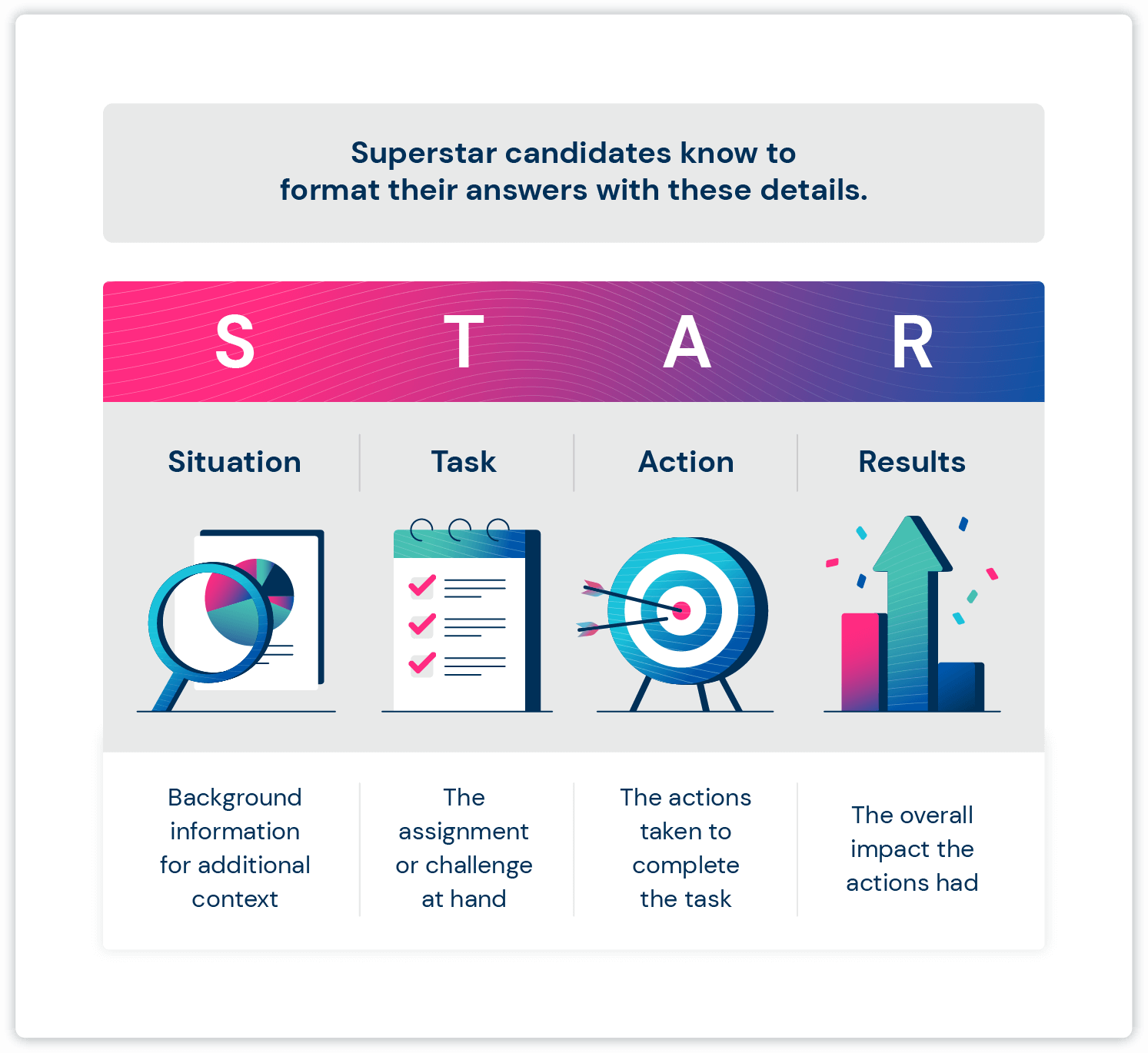
Weak Candidate Answer:
- The candidate explains the reason sales goals weren’t met, but doesn’t share a strategy to improve future sales during economic fluctuations.
- The answer doesn’t share what product is being sold, why existing prospects didn’t close or industry insights for additional context.
Strong Candidate Answer:
“A year ago we were pitching a simplified version of our marketing software to high-end freelancers and small businesses that didn’t need all of the bells and whistles. We were hoping this would fill in client churn gaps during an economic downturn.
Instead, we found that our product wasn’t flexible for smaller businesses without dedicated marketing roles. After a few months of lost sales, we sent our customer insights to product development to reconsider our solutions for individual businesses.”
- The answer provides the big picture of the sale, including the situation, task, action and result.
- The interviewee shows strategic thinking through identifying a core problem and initiating next steps to improve.
8. Tell Me About Your Most Successful Sale
There’s no better feeling than finally closing that big sale you’ve been working on for months. It’s only fair that you allow candidates to brag about their greatest wins as well as the losses they’ve grown from. Plus, you get to see their enthusiasm and potential in sales.
Weak Candidate Answer:
- Answers that don’t highlight any challenges they encountered in the process or what made this deal especially successful (aside from the size) or they miss the chance to share their skills that helped them close.
- Interviewees that don’t dig into their sales process may not provide enough context to build on their experience as a salesperson.
Strong Candidate Answer:
“Last year I had a particularly tricky prospect who wanted to optimize their e-commerce shopping pages, but their site had some larger issues to take care of first and they didn’t have the budget to complete an entire redesign.
I was able to talk with their team to identify the core pain points for customers. I pulled a few package options that would improve their primary product pages and checkout process and provided consultation on how they could continue to clean up their site while staying within budget. After a few months, we closed the $125,000 web design deal and cemented our relationship so they can trust us when they’re ready to reinvest.”
- Great answers show the continued value of satisfying the customer’s needs and how the success is more than the initial dollar amount.
- The candidate details the sales process and challenges that made this deal particularly meaningful for them while showcasing their strategic skills.
9. Are You Comfortable Making Cold Calls?
Cold calls may not be the most exciting part of the job, but they’re still a valuable part of many teams’ sales pipelines. If that’s the case for your team, you’ll want to know that your salespeople are confident and capable of making cold calls to grow your business.
Weak Candidate Answer:
- Candidates who aren’t interested in cold calling likely aren’t a fit for your company.
- Candidates who avoid naming their specific experience with cold calling or who can’t share similar outreach processes that they’ve participated in, like cold emailing, may not have the experience you want.
Strong Candidate Answer:
“Yes, cold calling has been a core component of my sales strategy since the beginning of my career. I typically aim to complete 35 calls a day and average a 2% conversion rate.”
- Candidates should share their experiences cold calling, including the amount of time they’ve cold called, industries and audiences they have experience with and their tracked metrics.
- A great answer goes further to offer statistics that back up their experience, like their conversion rates or how many calls they’ll make to one prospect.
10. What Sales Software and Technology Are You Familiar With?
An amazing candidate doesn’t have to know the ins and outs of every program you use, but experience working with similar software can improve onboarding and efficiency. Even entry-level interviewees who haven’t worked with your software should be able to name other programs they’ve worked with or how they expect to adapt to your processes.
Weak Candidate Answer:
- The interviewee doesn’t have experience with sales software or other workflow programs, like time tracking or HR software.
- The candidate doesn’t name any software or show any initiative to learn.
Strong Candidate Answer:
“I’ve worked with a few different CRMs and have the most experience working with Salesforce and Pipedrive. Salesforce is my personal favorite since it is so robust and I really like the added Sales Cloud feature with in-time customer data.”
- A strong answer names specific programs and how they’ve utilized them in other roles.
- If software experience is limited, a quality candidate can share how they’ve learned other programs and their proficiency with technology as a whole.
11. What Excites You About the Future of Sales?
The ability to consider the direction sales careers are headed and how the candidate fits into that picture shows that they’re active in the community and stay up to date on trends and technology.
Weak Candidate Answer:
- Candidates who can’t identify upcoming trends or expectations may have less experience or are out of touch with the industry’s evolution.
Strong Candidate Answer:
“Even in the last 10 years, the amount of data and amazing tools sales teams have access to now has been revolutionary for connecting with prospects and optimizing communications. I’m excited to see continued developments improve our ability to build trust with clients and improve the buyer’s experience.”
- A strong answer names specific trends they’ve seen in the field and can apply them to their own experiences.
- Candidates may earn bonus points if they can speak to how sales is evolving in your specific vertical.
12. What Do You Like Least About Sales?
You’ll be hard-pressed to find a candidate who loves everything about their job, from cold calling to closing. It’s OK to have preferences, but interviewees should remain positive and explain how they stay motivated even if they don’t love the task.
Weak Candidate Answer:
- A weak answer focuses on the negatives of a specific task without any solutions.
- Candidates who don’t name something they don’t like in sales may be perceived as insincere.
Strong Candidate Answer:
“I’d say that continuing to follow up after the second or third missed connection isn’t my favorite, because it can feel like misused time when I have other connections to maintain. However, I understand that a majority of sales are closed after a few missed calls or rejections and that it’s valuable to continue nurturing these relationships.”
To stay on top of these tasks, I have a set time twice a week to follow up with missed connections or rejected proposals. It’s blocked off in my calendar and I vary the times biweekly to ensure I’m not reaching out to the same prospect at the same time.”
- A strong interviewee will explain why they don’t like a task while acknowledging its value to the position and company.
- Good answers focus on the positives of a task and how a candidate tackles the task despite their personal feelings about it.
13. How Would You Handle a Challenging or Demanding Client?
No one said sales would be easy. Some clients are hard to win over, some are hard to get ahold of and others want the world from you. Good salespeople can address a prospect or client’s needs, push back when appropriate and nurture a relationship through closing.
Weak Candidate Answer:
- Candidates who talk poorly of the prospect or client are unlikely to fit in with your team.
- The answer should speak to the client’s concern and outline the candidate’s specific actions to resolve the issue.
Strong Candidate Answer:
“Last year I was three months into working with a qualified lead that seemed to be less interested every day. It became harder to contact her, she wasn’t returning my phone calls and when we did connect, she seemed disengaged.
I was wondering what had changed because she was initially receptive. I researched the industry and business itself and didn’t see any news, so the next time we spoke I focused on building the relationship rather than the sale. I learned a little more about her and connected over our shared favorite TV show. I also found out her personal life was a little hectic, and we agreed to reconnect after a month.
I sent her a personal card and followed up the next month and commented on some good business news I had seen. She was appreciative of my extra care and initiated the next meeting to continue the sale.”
- A promising candidate can reflect on a specific experience they’ve had and how they navigated the challenge.
- Answers should acknowledge the client’s needs and feelings with respect and understanding rather than disdain.
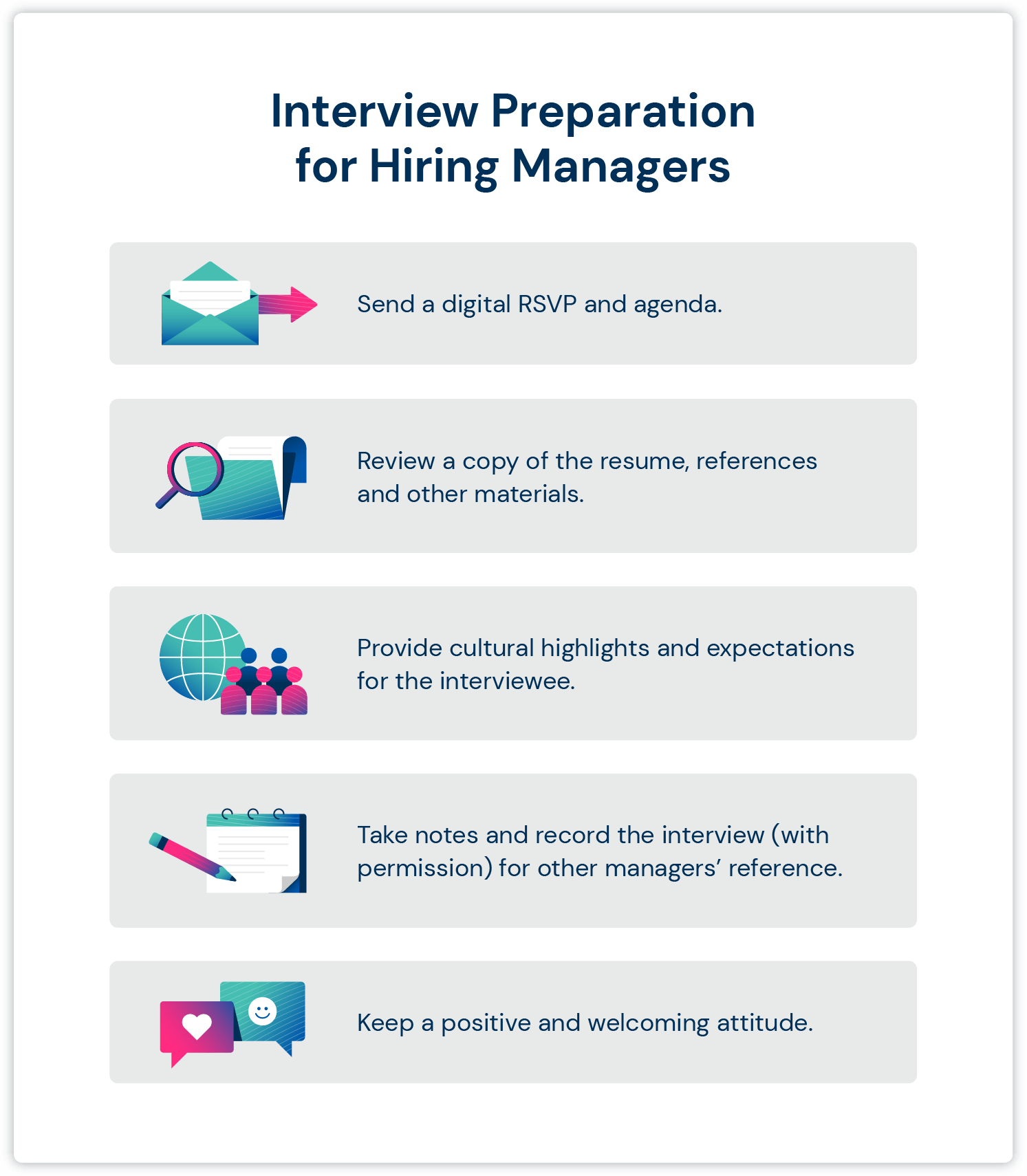
14. How Do You Determine a Prospect Is a Good Fit?
Sales is more than cold calls and creative presentations. Experienced associates can identify quality leads to focus on quality over quantity. Especially considering cold calls and emails have a notoriously low conversion rate, a candidate that knows where to direct their efforts can take the prospect all the way to closing.
Weak Candidate Answer:
- Some candidates may share their sales process and how they build relationships with prospects rather than how they vet them.
- Answers should be industry- or product-specific, showcasing experience deeper than general red or green flags in prospecting.
Strong Candidate Answer:
“My first step is to research the business and industry itself to determine what hurdles they may be facing and how our product can best benefit them. Next, I learn more about my point of contact and reach out to introduce myself. Once we begin regularly communicating, I continue to watch business trends and note the prospect’s behavior and interactions.
Are they engaged in our conversation? Are they asking questions or just listening? Do they seem excited or do I have to follow up frequently? If there’s any concern that they’re not interested, I’ll draft a pitch of what we think our ultimate solution may be and ask outright if they’re interested in continuing our business relationship.”
- Experienced interviewees have vetting tips for every step of prospecting, from initial communications to research.
- A good answer highlights what a candidate looks for in the prospect’s business and products, as well as their interactions and behavior.
15. Would You Close a Guaranteed $15,000 Deal or Attempt a $115,000 Deal?
Depending on your business and expectations for sales teams, either answer could be the “right” answer. There’s no denying that small deals add up quickly, and a guaranteed deal allows salespeople to also nurture other prospects.
However, a salesperson willing to take risks and who has the confidence and experience to close a huge deal is an asset to your team. Ideally, a candidate is interested in pursuing both prospects and can balance their workflow accordingly.
Weak Candidate Answer:
- An overeager candidate who chooses to go after the larger deal without explaining how they make this choice or how they’d secure against the potential loss is too much of a risk for many sales teams.
- On the flip side, someone who plays it safe without explaining how they’d support sales goals with other prospects doesn’t show the initiative to pursue and balance several midsize deals.
Strong Candidate Answer:
“Both are appealing, but it ultimately depends on my sales goals that month and what other prospects I’m nurturing. If I have several midsize deals that are close to closing, it may be worth the risk to go after the big win. If we’ve been experiencing a seasonal slump, then I don’t believe it’s wise to pass on guaranteed revenue of any size. I’d also consider my personal workload and if the $115,000 deal is even a great fit for both parties.”
- A good answer could go either direction, but the candidate would emphasize the importance of maintaining relationships with several prospects to meet sales goals month over month.
- Experienced candidates can also speak to how they evaluate prospects to determine which deals are the most viable and best meet the company’s needs and goals.
16. Which Do You Think Is More Important: Sales Goals or Customer Satisfaction?
This is somewhat of a trick question because both are vital to closing deals and maintaining the brand’s reputation. Associates that consistently miss sales goals aren’t contributing to business growth, while low customer satisfaction scores result in fewer qualified leads.
Weak Candidate Answer:
- Candidates who agree one is significantly more important than the other without highlighting the values of each may not be a balanced fit for the company.
- Answers indicating that both are important without further insight or application to personal experiences aren’t incorrect, but don’t showcase the individual’s expertise.
Strong Candidate Answer:
“I don’t really believe one is better than the other — instead, they’re collaborative. Maintaining a positive relationship with a prospect may not earn you a sale today, but you never know what their budget will look like next year or if they’ll recommend you to their network. Good relationships are good for business.
On the other hand, you do need to maintain your sales pace for the business to stay afloat and continue to innovate solutions that meet the needs of your clients. When you connect with prospects, they share their needs, which informs your business and the cycle continues.”
- Strong candidates know that word of mouth is king and that they need to maintain sales goals for their individual success as well as the business’s.
- The best answers detail why each matters and how a great salesperson can achieve both in their workflow or advice for developing these skills.
17. Would You Be Able to Jump on a Sales Call Now?
Confidence is important, but it doesn’t make someone a salesperson on its own. Good salespeople know that they can’t effectively sell a product if they don’t know the details, build relationships or understand the company’s expectations and culture. This question allows managers to identify confident candidates who know their limits and the importance of preparation in closing a deal.
Weak Candidate Answer:
- Inexperienced candidates may be eager to please and say “yes” without knowing the company or product details.
- Even the preferred “no” isn’t a great answer if the person can’t explain why they said “no” and what they’d need to know before they’re qualified to hop on a sales call.
Strong Candidate Answer:
“I’m a confident salesperson and am always happy to cold call, but I don’t have the understanding of your business goals or product capabilities that I’d need to effectively make a sale. I’d be interested to learn more about your onboarding and training schedule for when you do expect new hires to begin owning sales calls.”
- Quality salespeople will identify their limits and share what they expect to be briefed on before entering sales calls.
- A strong interviewee may also take advantage of this opportunity to ask the interviewer about their training process and expectations as salespeople advance to taking calls.
18. Tell Me About a Time That You Turned a “No” Into a “Yes”
Salespeople often encounter more closed doors than open ones, and they have to know how to get their foot through the door anyways to succeed. This question gives candidates the chance to flex their skills identifying and evaluating questions, concerns and needs to find applicable solutions that can finish the deal.
Weak Candidate Answer:
- Inadequate answers may share a specific experience where a “no” was turned into a “yes” without identifying the best practices or process steps the salesperson used.
- Candidates who can’t identify a time they turned a rejection around in sales or otherwise may not have significant sales experience and would likely require additional guidance if hired.
Strong Candidate Answer:
“I’m not a stranger to a ‘no.’ Just last month I was following up with a qualified lead who had rejected our proposal last summer. They were seeing heavy client churn and couldn’t validate the extra expense.
I knew they were preparing their budgets for the next year, so I first reached out around October to touch base before the holidays. I shared some of the new features we were rolling out in February and how they’d help the team maintain client relations, and he was eager to continue discussing the deal. Within a month, we were able to find other applications that would improve their outreach efficiency by 5% and clear the expense with their shareholders.”
- Strong candidates can share a specific situation where they closed a deal after an initial rejection while explaining how they did it, such as follow-up emails, company research or positive relationship building.
- Promising salespeople who may be early in their career may share a similar situation where they turned a “no” into a “yes” while identifying what sales techniques they applied in the process.
19. What Would You Do if You Weren’t in Sales?
This is an opportunity to learn more about the candidate you’re talking to and acknowledge some of their tangential skills that could benefit their role or the wider team. There’s not necessarily a wrong answer, as long as the candidate can explain what aspects of the career appeal to them and how they may apply to their position with your company.
Weak Candidate Answer:
- Some individuals may share that they can’t imagine themselves anywhere but sales. While the enthusiasm is appreciated, it may be insincere or shows the candidate’s lack of consideration.
- Weak answers may share an alternate career without connecting that role’s expectations or skills to the position the candidate is interviewing for.
Strong Candidate Answer:
“I think I’d be interested in public relations since I’d still be able to apply my relationship-building experience. The outreach process of identifying and pitching media outlets is similar, and I personally really enjoy the presentation-building aspect of sales. I could utilize my language and speaking skills to engage with a wider audience and still help drive leads to sales teams.”
- A well-thought-out answer identifies an alternate career, what the interviewee finds interesting about it and how those interests help them excel in sales or as a teammate.
- Experienced candidates without another professional passion can also share their hobbies while highlighting how their practices benefit their success.
20. How Do You Keep Up With Your Target Audience?
Keeping up with industry trends allows salespeople to better connect with clients and leads while understanding their needs and potential concerns. Beyond current trends, experienced salespeople look to the future so they can position their product as a solution to current and upcoming needs.
Of course, even in the same industry, two businesses’ experiences can vary significantly. While one may be experiencing large layoffs and client churn, another may have more secure funding or partnership with a stable industry that helps them thrive through economic turmoil. Digging into the details helps salespeople remain empathetic and sensitive to individual needs rather than casting blanket assumptions based on big-picture trends.
Weak Candidate Answer:
- Less impressive answers may share actionable ways they’ve kept in touch with industry trends or a business’s news, but not both.
- Vague answers like “signing up for newsletters” don’t apply their personal experiences or more impressive actionable steps.
Strong Candidate Answer:
“When I started my current position, I didn’t have any experience in the technology industry. It’s a huge industry to keep up on, so I started small with my specific niche in IT solutions. I learned about the different types of IT roles and common challenges by joining career-oriented groups on social media sites.
I also took the time to find the thought leaders of the industry to follow across platforms, and identified career associations and media outlets to stay up to date with newsletters and trends reporting. I set a biweekly agenda to attend a webinar or watch a recorded presentation, and review newsletters each Friday to keep up on trends.”
- The best answers include personal stories of past experiences, like how a candidate has tuned into other industries they’ve worked in and how they applied it to prospecting.
- Strong candidates can also share strategic insights for learning more about a client or industry, like a checklist of “must-know” items or a routine such as attending one webinar a month.
21. What Makes You a Good Salesperson?
Every individual has their strengths and weaknesses, and any combination of qualities can make for a great salesperson. Hiring managers should pay attention to how a candidate applies their qualities and experiences to the core requirements of sales.
Weak Candidate Answer:
- Interviewees who share their personal qualities, like tenacity or great communication skills, but neglect to mention experiences or growth points that have shaped them into a great salesperson may be leaving an opportunity to impress on the table.
- Candidates who don’t apply their qualities or experiences to specific expectations of a salesperson, especially considering your company’s industry, leave their answer up for interpretation.
Strong Candidate Answer:
“I think my interest in analytics is my greatest asset as a salesperson. I love to connect with prospects and build those relationships as a people person, and I have no problem reaching my activity metrics. But my favorite part is digging into customer research and high-level metrics that can help me strategize the perfect presentation or find creative solutions to improve my conversion rates, then share those experimental insights with my larger team.”
- Strong answers will detail a candidate’s personal experiences of how their individual qualities have helped them grow and extend that growth into their future goals and expectations.
- Experienced candidates will also know to consider the company’s products, services or industries when explaining what makes them a great salesperson at your specific company.
22. Explain a Time You Were Especially Creative To Make a Sale
Problem-solving is a creative practice and a necessary skill to succeed in sales. Interviewers in especially difficult industries or with unique products and services will appreciate seeing how a potential employee navigates challenges and applies their experiences in a creative way to address prospect questions, concerns and needs.
Weak Candidate Answer:
- Candidates who reiterate the sales process without highlighting a unique challenge or angle they’ve taken to win a deal haven’t taken advantage of the opportunity to showcase their creativity.
- Poor answers don’t include the specifics of a challenge and how the interviewee’s creativity helped them overcome it.
Strong Candidate Answer:
“I previously had a prospect interested in our HR software who loved the PTO reporting, but was disappointed that it didn’t track vacation hours automatically. They were considering a competitor’s service that offered this bonus at a slightly higher price.
I was stuck on solutions and reached out to our development team, who said they actually just started building this solution following product team research and that they expected it to roll out in 10 months. I shared this information and offered an additional 5% discount on our services to sweeten the deal, and they were ecstatic to save on their investment and guarantee all of their needs would be covered. We then added a bimonthly internal call to keep sales teams updated on future features that could be leveraged.”
- Responses that name a challenge and detail the process of ideating a creative solution best show the candidate’s problem-solving skills and resolution.
- Candidates who can share long-term applications of creative solutions, such as how one specific sales solution was also applied to improve teamwide efficiency, can also highlight their strategic thinking.
23. Which Sales Metrics Do You Believe Are Most Valuable?
Data tracking and analysis are key to effective sales strategies that can evolve and scale with your business needs. Advanced candidates should be able to name the metrics that are most valuable to them and how they apply them to their role. Entry-level salespeople should still have familiarity with key metrics and why they’re important, but may not be able to speak to applying metrics to strategy.
Weak Candidate Answer:
- Most valuable metrics can vary by seniority and specific role, but a candidate who can’t speak to why a metric is so important and how to analyze and apply those insights misses the chance to share their strategic skills.
- Sales metrics track every step of the sales process, and candidates who can’t speak to metrics specific to the role they’re interviewing for may not have the experience you want.
Strong Candidate Answer:
“Tracking activity metrics is hugely important to ensuring an efficient and productive workload across your team, while providing predictions for sales growth by the end of the month.
That said, I think conversions and average revenue by prospect are most important to identifying where your team can improve revenue by learning which prospects are most receptive and what worked in the sale, and identifying what size deal you need on average to maintain your goals.”
- Sales is about revenue at the end of the day. Interviewees that share what specific revenue metrics they track and how they consider this data, like seasonality or revenue per account, show that they’re always considering where there’s room for improvement and measuring against their goals.
- Strong answers may also share a candidate’s preferred tracking method, how often they review this data, where it’s reported and specific examples of how they’ve analyzed and applied data previously.
Other Questions To Ask in a Sales Interview
You’re not just interviewing a salesperson — you’re getting to know a potential teammate and considering how they fit with your management style and company culture.
These questions dig into the person behind the sale to learn more about them, their motivations and their personality so you can hire the perfect candidate with confidence.
Personal Career Questions
Ask these questions to learn more about a candidate’s career goals and personal interests to determine their long-term fit with your team.
- What are your career goals?
- Why should I hire you?
- How do you stay motivated at work?
- Where do you see yourself in five years?
- What are your greatest strengths and weaknesses?
- What do you think will be the biggest challenge in your first three months with the team?
- What are your long-term career goals in sales?
- What hobbies do you enjoy outside of work?
- What do you think is the most important quality in a salesperson?
- What excites you about this position and its responsibilities?
Situational Interview Questions
Situational questions dig deeper than theoretical knowledge and ask the candidate to detail their personal experiences and application of sales skills to see how they work through real challenges.
- Have you worked remotely before? If so, what challenges did you encounter?
- Explain a time you previously managed conflict with a coworker.
- Tell me about a time you received constructive criticism and how you responded.
- Can you explain a time you’ve made a mistake and how you addressed it at work?
- How would you handle an unresponsive prospect?
- Imagine you’re wrapping up the month and aren’t on track to reach your sales goals. What would you do?
Culture Fit Questions
Team culture plays a significant role in individual job satisfaction and team workflow. As a manager, you should be able to identify what makes your team tick and who would be an asset to the company culture.
- Would you describe yourself as more creative or more analytical?
- What separates you from other candidates we may be interviewing?
- Would teammates describe you as more collaborative or competitive?
- What have you liked most and least about previous management styles you’ve worked with?
- Why are you interested in our company or industry?
- What did you like best about the culture at your last company? What would you have improved if you could?
Sales Manager Questions
Sales managers have different expectations than a typical sales representative, and these questions will help you understand an interviewee’s strategic and leadership skills.
- Describe a time you’ve previously given difficult feedback with a direct report.
- How would you describe your management style?
- How would you motivate an employee who’s struggling to maintain their sales goals?
- How do you build a rapport with your team?
- What qualifications and attributes to you look for in a sales representative?
- Describe a time you had to implement a new process with your team and how it went.
Sales Representative Interview FAQs
If you’re new to sales or looking for help preparing for your next interview, learn more about the process and how to answer sales interview questions below.
What Do Sales Interviewers Want To Hear?
Interviewers want to understand your sales and industry experiences, as well as get proof of your competency as a sales representative. Interview questions may ask about:
- Your employment and industry experience
- Your understanding and execution of the sales process
- What you know of the company and your interest in the role
- Situations you’ve been in to validate your expertise
- Data-backed examples of success and growth
- Personality and expectations to understand the culture fit
Pre-preparing answers to common interview questions and learning as much as you can about the company and its products or services is a great start. You should also reflect on your own working experiences and prepare stories and statistics to prove your potential.
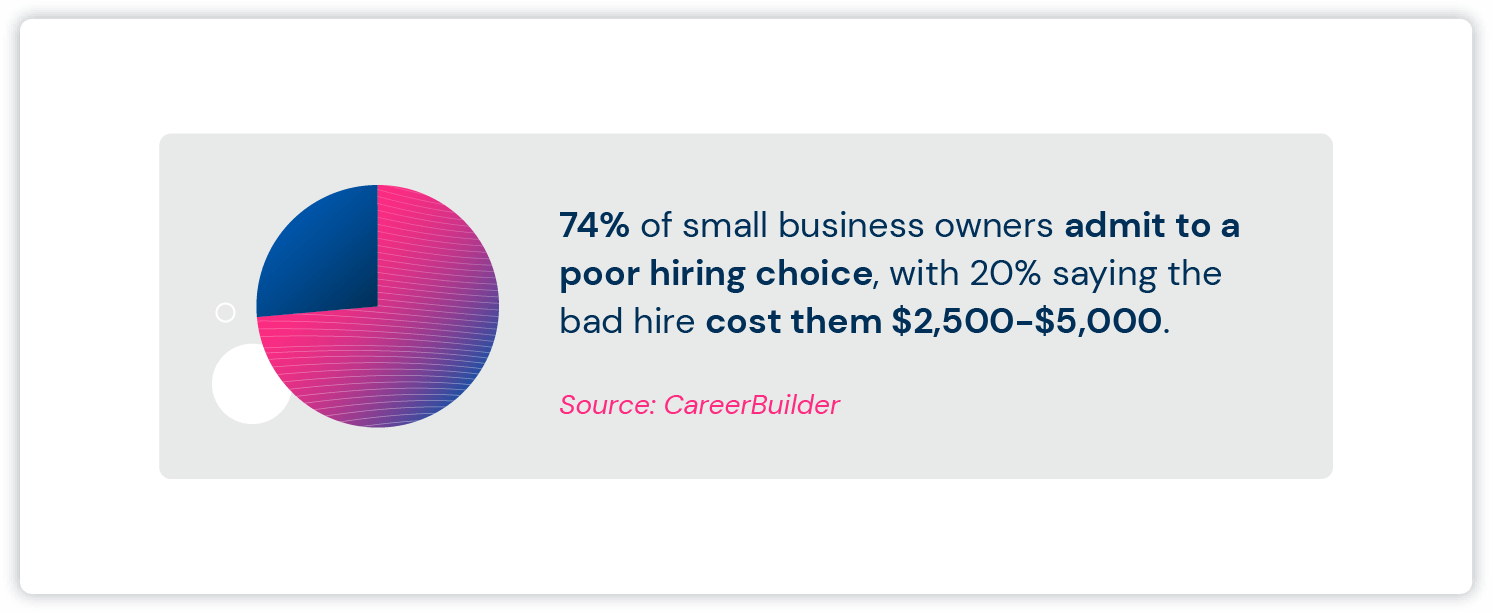
Source: CareerBuilder
How Do You Pass a Sales Interview?
The best way to pass a sales interview is to prepare thoroughly by researching the company, the industry and products or services that will be sold. You’ll also need a strong understanding of the sales process and be able to showcase these skills with past successes or mock pitches.
Confidence is key in sales and in interviewing, so the more you prepare, the better you can sell yourself. You can print your application materials, bring notes with data and experiences, and practice your interview answers as much as you’d like — so long as they don’t feel scripted.
What Are STAR Interview Questions?
STAR interview questions ask candidates to tell a story, and often begin with a phrase like “Describe a time that you…” They’re called STAR questions because the answers should match the STAR framework, including:
- Situation: Provide context for the story
- Task: Explain the assignment or challenge in this situation
- Action: Describe what you did to complete the task or challenge
- Result: Share the impact your actions had for the task and team
The STAR framework helps candidates organize their story to follow a chronological sequence and put the most important details front and center.
How Do You Sell a Pen or Apple?
This is a common sales interview question that gives the interviewee a chance to flex their sales expertise and challenges them to sell something mundane, like a pen, to the interviewer.
Candidates should apply sales best practices to their answer and try to connect with the interviewer as they would any prospect. First, identify the benefits of the pen. Does it add value or solve a problem? How is it different from other pens?
Next, the interviewee should apply the pen’s benefits to the interviewer and their needs. The candidate can ask questions about their workflow or suggest a common problem, like ballpoint pen rollers sticking in the middle of notetaking.
Then the candidate can detail the benefits of the pen, how it improves the manager’s life or work and finish with an attempt to close. A quality salesperson should be able to showcase their experiences and customize the pitch based on the interviewer.
What Questions Should You Ask an Interviewer?
Many candidates leave an interview without ever asking their own questions, which can make the process feel one-sided and leave hiring managers feeling like you’re not so invested in the company or position.
If you’re not sure what to ask, here are a few questions to work from:
- What qualities do you believe are essential to success in this role?
- What are your expectations for the first three months, and what would an exceptional performance in the first three months look like?
- What direction is the company headed in and where do you think it will be in five years?
- How long is the onboarding and training process until I’d be a fully utilized employee?
- What is the biggest challenge that I may face in this role?
- Can you tell me more about the team I’d be working with?
- How do you expect this role to evolve in the next few years?
- What do you like about the company that you haven’t experienced anywhere else?
- What metrics or goals will I be evaluated on?
- Do you have any reservations about my experience or fit with the company we could talk about?
Your sales team is a vital part of your company and hiring the best ensures your team can continue to innovate and grow within your industry.
Whether you’re new to hiring or just looking for some creative questions, these sales interview questions will help you find the candidate you’ve been looking for.



